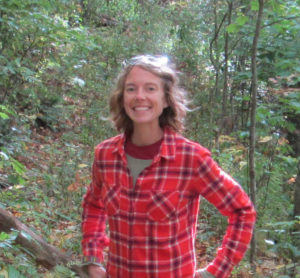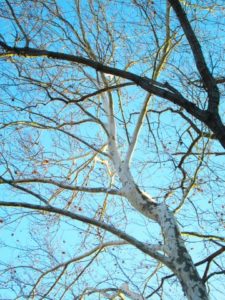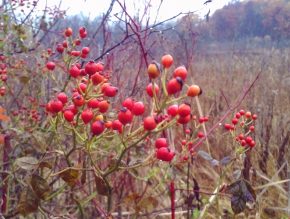 Susie Huser holds an MFA from Naropa University and is completing an MS in Environmental Studies through Green Mountain College. She lives in southern Michigan, where she is serving as Camp Friedenswald’s Outdoor Education and Sustainability intern. Engaging with the natural world through outdoor activities and art has been a source of joy and sustenance for as long as she can remember. Current projects include composition and illustration of a creative field guide for Camp Friedenswald. This post originally appeared on Camp Friedenswald’s blog.
Susie Huser holds an MFA from Naropa University and is completing an MS in Environmental Studies through Green Mountain College. She lives in southern Michigan, where she is serving as Camp Friedenswald’s Outdoor Education and Sustainability intern. Engaging with the natural world through outdoor activities and art has been a source of joy and sustenance for as long as she can remember. Current projects include composition and illustration of a creative field guide for Camp Friedenswald. This post originally appeared on Camp Friedenswald’s blog.
When you walk in the woods on a daily basis, or regularly spend time outside wherever you live, you notice rhythms, patterns and changes. On Turtle Hill the light changes every day. Over the past six weeks or so the light has evolved from a vibrant tea-made-from-fresh-herbs green, to luminous gold, to the crisping light of winter. On cloudless days the white sycamores and pale beech trees shine against bright blue, branches reaching skyward in bold nakedness.

Bare sycamore branches on a day of sun.
The neighboring fen changes, too: Take a hike on a wet day now, and you become part of a historied sepia-tone photograph, the cattails espresso brown and dirty white, their spent leaves the color of wheat ready for harvest. The seed heads of countless forbs announce their geometry in bold almost-black, their stalks providing pale contrast; redosier dogwood flares up a festive highlight here and there, invasive multiflora rose hips become gems, and the tamaracks are nearly turmeric. There are fewer and fewer hours of daylight in which to observe all these things.
____________
In the midst of all this shutting down is an ambitious gathering up. One finds piles of walnut husks a foot in diameter — the leavings of some squirrel who chewed through a hundred shells. Woodpecker percussion consistently echoes throughout any of Camp’s wooded areas, and sometimes shakes house walls. Chipmunks disappear under decaying logs, cheeks filled taut. Passing a field of harvested corn one day, I see sandhill cranes gleaning anything the combine left. Eating and storing up energy becomes top priority for creatures that opt to remain out in the world as temperatures and daylight hours drop off.
____________

Berries of the invasive multiflora rose accent the fen on wet days.
We in the human world gather up, too, seeking nourishment from feast and fellowship to fend off the ancestral notion that things are ending. Darkness hems in the light, and we celebrate.
What abundance there is! Wendell Berry articulates the wonder of it:
And yet no leaf or grain is filled
By work of ours; the field is tilled
And left to grace. That we may reap,
Great work is done while we’re asleep…[1]
Mornings I walk past the fen and the refraction of light from thousands of frosted seed heads is blinding. I walk at night during a new moon and there are so many stars, the constellations are difficult to discern. Two barred owls call to each other; a fox barks through the darkness; four tall white tails bound off through the meadow, up the hill and disappear. A screech owl whinnies from just a few feet away, and as I climb a hill I smell decaying leaves and skunk. Cold wind sets trees singing and makes my nose run. Through all this I pass with my senses awake to so much life, aware that were I asleep the same life would keep calling out.
_____________
What do we celebrate when we sit down with family and friends to holiday tables? Are we awake to the abundance?
This holiday season, I am awake, awake especially to the fact that a place like Camp, through the human and non-human communities alike, provides daily reminders that we are blessed.
We celebrate:
That we are here, together.
The miracle of taste buds, the wonder of different textures, flavors and aromas.
That there is more than enough to eat, that people labored to grow food, to transport food, stock food, prepare food.
That there was water and sunshine and soil, and that the food grew.
That we have warmth and shelter from the weather.
That weather happens.
That Camp hosts such biodiversity, that we live among such plants and creatures.
That even in cities we find non-human life persisting.
That we are alive, and that we have the capacity to feel joyous, and thankful.
____________
Opening the gates to this list catalyzes a sort of stampede of graciousness that almost becomes overwhelming and brings to mind the flock of grackles that visited Turtle Hill a couple weeks ago. Even from behind closed windows I hear their squeaky, tumbling conversation, two-hundred voices talking at once. When they fly past the windows in one rushing wave it sounds like a passing train.
_____________
During my new moon walk I crane my neck looking for some cluster of stars that would render the night sky familiar. I find Pleiades after a minute or two, then notice to the west an Orion-sized arrangement of eight or so brighter pinpoints. Not a constellation I’ve learned in the past, my eyes connect the dots and form their own story — a story inevitably colored by my humanness, but no less true for the fact.
In the stars I read a figure running through the night sky, arms raised and head thrown back in jubilation.
__________________________
[1] Berry, W. (1998). X. In A timbered choir. Berkeley, CA: Counterpoint.

